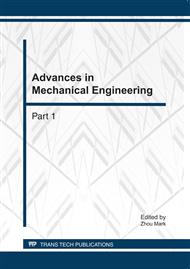[1]
Kühn W. Digital factory-simulation enhancing the product and production engineering process: Proceedings of the 2006 Winter Simulation Conference, Monterey, (2006), 1899-(1906).
DOI: 10.1109/wsc.2006.322972
Google Scholar
[2]
Kusiak A. A knowledge-based system for scheduling in automated manufacturing. Mathematical and Computer Modeling, 13(3), 37-55(1990).
DOI: 10.1016/0895-7177(90)90369-x
Google Scholar
[3]
Metaxiotis K. S. Askounis, Dimitris. Expert systems in production planning and scheduling: A state-of-the-art survey. Journal of Intelligent Manufacturing, 13(4), 253-260(2002).
Google Scholar
[4]
Bensana E., Bel G. O. A multi-knowledge based system for industrial job-shop scheduling. International Journal of Production Research, 26(5), 795-819(1995).
DOI: 10.1080/00207548808947904
Google Scholar
[5]
Soyuer, H., Kocamaz, M. Scheduling jobs through multiple parallel channels using an expert system. Production Planning and Control, 18(1), 35-43(2007).
DOI: 10.1080/09537280600940689
Google Scholar
[6]
Ozbayrak M., Bell R. A knowledge-based decision support system for the management of parts and tools in FMS. Decision Support Systems, 35(4), 487-515(2003).
DOI: 10.1016/s0167-9236(02)00128-8
Google Scholar
[7]
Zuelch G. Modelling and simulation of human decision-making in manufacturing systems. Proceeding of the 2006 Winter Simulation Conference, (2006), 947-953.
Google Scholar
[8]
Van der Zee D.J. Modeling decision making and control in manufacturing simulation. International Journal of Production Economics, 100(1), 155-167( 2006).
DOI: 10.1016/j.ijpe.2004.11.001
Google Scholar
[9]
Zhang X., Schmidt L., Schlick C., Reuth R., Luczak H. A human task-oriented simulation study in autonomous production cells. International Journal of Production Research, 45, 1-29(2007).
DOI: 10.1080/00207540701222768
Google Scholar
[10]
Edwards J. S, Alifantis A, Hurrion R. D. Using a simulation model for knowledge elicitation and knowledge management. Simulation Modelling Practice and Theory, 212 (7-8), 527-540(2004).
DOI: 10.1016/j.simpat.2003.09.003
Google Scholar
[11]
Robinson S., Edwards J. Modeling and improving human decision making with simulation. WSC: Association for Computing Machinery, (2001), 913-920.
Google Scholar


